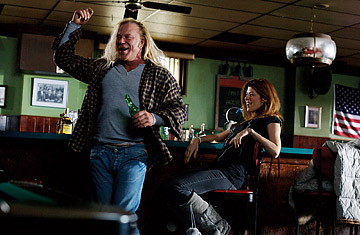
Mickey Rourke and Marisa Tomei in The Wrestler
The Wrestler doesn't open till Wednesday, and already Mickey Rourke has won Best Actor from the Boston and Washington, D.C., critics groups and earned a Golden Globe nomination in that category. His performance as a broke, broken-down fighter stoked Wrestler-mania at the Toronto Film Festival and, before that, in Venice, where the film had its world premiere (winning the top prize). That was back in early September, when the Los Angeles Times headlined the question: "Will The Wrestler get hold of an Oscar for Mickey Rourke?"
My guess: maybe, because Hollywood loves a comeback story, and because Rourke gives the kind of performance that members of the Motion Picture Academy think burrows into the very essence of acting. He made himself nearly unrecognizable — put on maybe 40 lb., studded his face and body with the scars of war — to play a has-been fighter hoping for a last shot at the big time. It's the kind of punishment that won kudos for Lon Chaney and Paul Muni in the old days and helped Robert De Niro to an Oscar in Raging Bull playing Jake LaMotta. (He got himself into fighting shape, then he gained a ton of weight! Acting!) One more because: Rourke does strong, sensitive work here, which will cheer his old-time admirers and win him new fans. All praise to him, and to Darren Aronofsky for casting the actor and directing him to turn a standard fiction into quirky, coherent behavior. (See TIME's top 10 movies of 2008.)
But the movie itself is pretty bad.
My own anticipation sank with the opening credits: "Mickey Rourke, Marisa Tomei, Evan Rachel Wood." That list spelled out the plot: damaged veteran, middle-age girlfriend, young daughter. The Wrestler never rose above fight-movie bromides, never dispelled my gloom. The character stereotyping makes Sylvester Stallone's Rocky Balboa, by comparison, seem as swathed in moral ambiguity as Luchino Visconti's Rocco and His Brothers. The movie's serioso sentimentality is doubly strange since the script is by Robert Siegel, an ex-staffer of The Onion and co-writer of The Onion Movie. His old job was puncturing clichés; here he recycles them.
Story goes like this. Back in the '80s, Randy "The Ram" Robinson (real name: Robin Ramzinsky) was a hero-stud pro wrestler; he fought "the Ayatollah" at the top of the Garden card. But after 20 years on the downalator — his body ballooned with exercise, bloated with steroids and damaged with the death of a thousand cuts — Randy works tank towns for a few hundred bucks. He's been locked out of his Jersey trailer home for laggard payments. And to secure the fans' roving attention, his ring rivals are getting into extreme fighting; one fellow, who looks like an angry Ozark farmer, asks Randy if, during their bout, he can use a staple gun on his chest and back. That episode triggers a heart attack, and Randy is told never to wrestle again.
Anyone who's seen a fight film will be able to predict the rest of The Wrestler. Randy gets one more chance: a 20-year rematch in Wilmington of his Ayatollah fight. Will he pass it up to save his life? (Not if there's gonna be an Act Three.) He also has a stab at mending the hearts of the women in his life. Will Randy manage to connect with his estranged daughter (Wood), who hasn't forgiven him for abandoning her? (That's Act Two, where the only innovation is that the girl's mother is never mentioned.) And will a local stripper, well played by Tomei, respond to his plaintive love and drive down to see what may be Randy's last fight? (Can't have a fight movie without a "Yo, Adrian!" moment.)
Aronofsky has been one of the few American directors whose movies upset the complacency of indie cinema. Pi, Requiem for a Dream and The Fountain were demanding and rewarding in various ways: the first wacko, the second gritty, the third sumptuously romantic, and all marvelously dense with imagery. So the big surprise in The Wrestler is that it's visually inert. Aronofsky's main camera habit is to follow Randy, just his imposing back, as he trudges through corridors toward another fight. (Martin Scorsese virtually patented that shot in Raging Bull and Goodfellas.) The trope does pay off later in the film, when the camera trails the briefly retired Randy down the stairs to his new job, behind a deli counter. But Aronofsky's main contribution was to lion-tame a jolting performance out of a forgotten hero.
